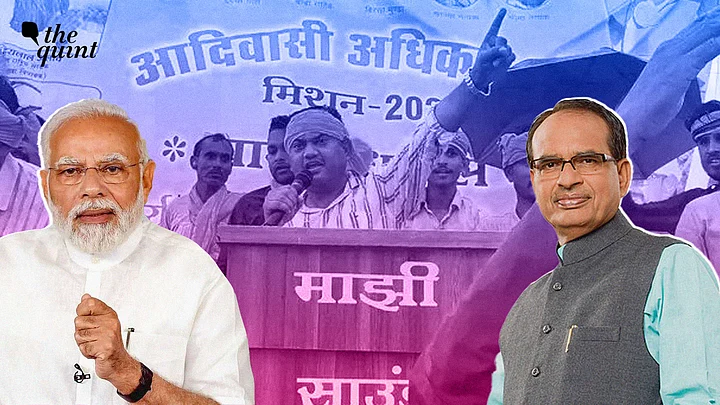The renewed buzz around the Uniform Civil Code (UCC) could once again revive fears among tribal communities in poll-bound Madhya Pradesh, Rajasthan, Chhattisgarh and Mizoram – all states with a significant tribal or Adivasi population. The potential of a backlash from the tribal communities isn’t lost on the Bharatiya Janata Party (BJP), and the party has begun contemplating and planning ways to prevent the fallout of UCC from hurting its prospects in the upcoming elections.
Tribal bodies across the three states have made it a point to assert their opposition to the UCC in the past, and now with the Law Commission soliciting views afresh from political and religious organisations on the issue, tribal leaders have begun expressing their resistance to such a code.
'UCC Will Worsen Our Conditions': Adivasi Groups
Speaking to The Quint, Hiralal Alawa, national convener of Jay Yuva Adivasi Shakti (JAYS), a Madhya Pradesh-based tribal body, said that “Adivasis won’t accept UCC come what may.”
“Any form of UCC will stand to threaten Adivasi customs and way of life. We have stood against such an imposition in the past and will continue to do so,” Alawa told The Quint. “We know the BJP doesn’t care for our rights. Earlier they insisted on calling us ‘vanvasi’ instead of ‘adivasi’ and completely undermining our identity, it shows what they really think of us,” he said.
Alawa is a first-time MLA from the Congress party, but has been vocal about his criticism of both BJP and Congress over the lack of implementation of laws and policies that cater to the needs of Adivasis in the state. “Schedule 5 and Schedule 6 of the Indian Constitution were meant to safeguard Adivasi rights. But in all these decades, no government has tried to formulate the rules of these two Schedules in order to implement them properly. The UCC will come as a further blow to an already precarious system,” Alawa said.
In 2016, the Rashtriya Adivasi Ekta Parishad, another body working for Adivasi rights, had moved the Supreme Court seeking protection of Adivasi customs and practices, including but not limited to the right to practice polygamy. Polygamy is one of the key issues that the proponents of UCC have brought up time and again.
Mizoram, too, has seen vocal opposition to any talk of UCC. In February this year, the Mizoram Assembly passed a resolution that said it is “unanimously resolved to oppose any steps taken or proposed to be taken for enactment of UCC in India." This is of especial significance since the ruling party in Mizoram is the Mizo National Front (MNF), an NDA ally.
Article 371G is in place in Mizoram, which states that no parliamentary act, pertaining to religious or social practices, or land and ownership rights, or other specific customs of the people, shall be applicable in the state unless the state legislature passes a resolution allowing so.
In December last year, a Rajya Sabha MP from the tribal community, Kirodi Lal Meena, who hails from Rajasthan, tabled a bill in the upper house to implement the UCC. This was seen as a move by the BJP – to have a tribal leader introduce such a bill and pre-empt some of the criticism that could come its way.
BJP's Delay Tactics, Mulling Over 'Special Provisions' In UCC
The BJP is conscious of the furore that may erupt among tribal sections of these poll-bound states. Sources told The Quint that on 18 June, a few days after the Law Commission’s notice, RSS and BJP leaders met in Madhya Pradesh to discuss the possible fallout of the UCC issue.
“Red flags of how the Opposition could use the UCC to spread fear and paranoia among the tribal group," a leader present in the meeting said. The BJP has been performing successively worse in the tribal seats of MP over the years. The state has a total of 47 seats reserved for Scheduled Tribes (STs), the party won 31 in 2013 and came down to half the figure in 2018 – 16 seats.
To avoid further depletion of the tribal support, the party is trying to push the passing of UCC till after the elections in the five states, thus, bringing it up in the winter session and not the monsoon season.
Second, in the run up to the eventual discussion on the bill, the BJP would try to ‘spread awareness’ of “all the good work it has done for tribal communities," sources said.
The BJP will try to talk up its implementation of the Panchayats Extension to Scheduled Areas (PESA) Act, which is said to be of significance to further Adivasi rights.
On Thursday, Union Home Minister Amit Shah flagged off the six-day Rani Durgavati Gaurav Yatra in Madhya Pradesh, after the famed tribal leader Rani Durgavati. As per the schedule, PM Modi would be present at the culmination of the yatra on 27 June. The party will also try to drive home the importance of the other, more symbolic gestures that it has made over the last few years.
In 2021, CM Shivraj Singh Chouhan announced the renaming of two important railway stations in the state after tribal figures. The CM had also announced the setting up of a memorial of the tribal figure Bhima Nayak in MP’s Barwani district.
Besides these tactics of delay and using the time till the UCC debate in the parliament, to hammer its 'pro-tribal' appeal, the BJP is also mulling over including special clauses in the Act that would safeguard Adivasi customs and practices.
“The Bill might include provisions that will make room for these concerns to be addressed. But that’s why the debate in the Parliament is important, to flesh out all these details," a BJP functionary said.
(At The Quint, we question everything. Play an active role in shaping our journalism by becoming a member today.)
